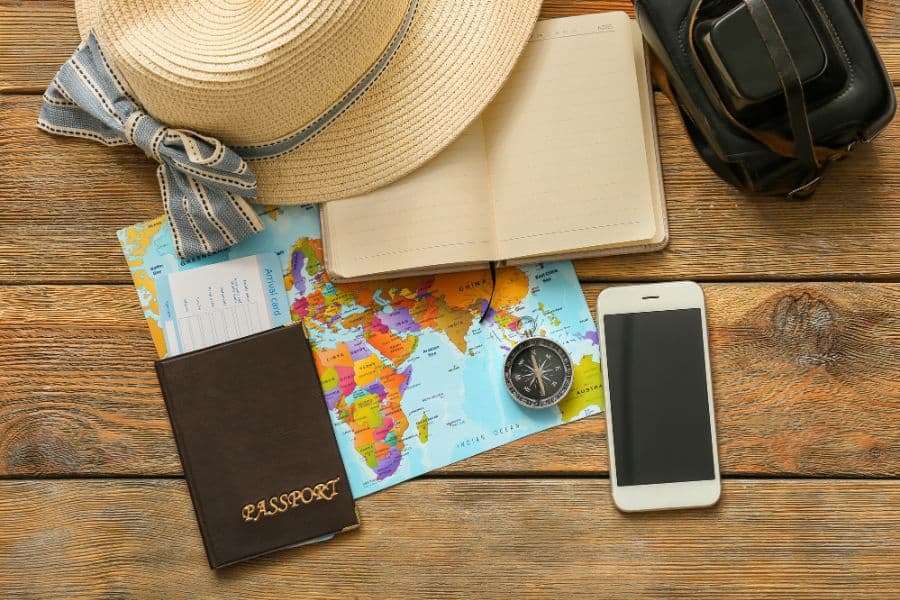- TRAVEL GUIDES
arrow_drop_down
- Canada
- United States
- Sunny Destinations
arrow_drop_down
- VIEW ALL
- BUCKET LIST
- ABOUT
- CONTACT
Traveling Abroad? 18 Important Things You Need to Do Before Leaving
- Travel Tips
-
Jun 12
- Share post

Planning an adventure abroad? There are some important things you need to do before you leave. By knowing these key steps, you’ll be all set for a smooth and fun journey. Keep reading to make sure you’re fully prepared for your trip!
1. Make Sure Your Passport Is up to Date
Before jetting off, check your passport’s expiration date. Many countries require it to be valid for at least three months beyond your trip. Don’t get caught off-guard; renewing can take time.
Start early to ensure a smooth journey. Also, confirm if a six-month validity is needed for your destination.
2. Apply for Necessary Visas
Before you jet off, check visa requirements for your destination. Some countries offer visas on arrival, while others need a bit more prep. Head over to the country’s embassy website or contact them for the latest details.
Keep an eye out for application times too—some can be lengthy! Remember, visas are your ticket to global adventure, so get this sorted early to ensure smooth travels.
3. Check for Travel Advisories
Before zipping up your luggage, make a quick check with the official U.S. Travel Advisories. This step is crucial to ensure your destination is safe and to know what to prepare for.
Things can change, so you want the latest info on hand. Not doing this could turn a dream trip into a real headache. Grab this must-have travel intel and enjoy your journey with peace of mind!
4. Get Travel Insurance
Getting travel insurance is a crucial step in preparing for your international trip. It’s not just another item to check off your list—it’s a way to protect yourself from unexpected expenses due to medical emergencies, trip cancellations, or lost luggage.
Travel insurance can offer a safety net, ensuring that an unforeseen event doesn’t ruin your travel plans or finances. Make sure to choose a comprehensive policy that fits your budget and covers all the activities you plan to do. Remember, it’s better to have it and not need it than the other way around.
5. Visit the Doctor for Vaccinations
Before jetting off to new destinations, make an appointment to discuss travel vaccines with your doctor. They’ll inform you about necessary immunizations, like MMR and polio, based on your travel plans.
Don’t wait too long—some shots need to be taken weeks in advance! Remember, staying up-to-date with vaccinations keeps you safe and ready to enjoy your adventure abroad.
6. Make Copies of Important Documents
Before jetting off, remember to copy your important papers! Your passport, driver’s license, and itinerary all deserve a Xerox moment. Slip a copy in your bag and leave another with a friend.
7. Notify Your Bank of Travel Plans
Before jetting off, it’s essential to tell your bank about your travels. Doing so helps prevent your card from being blocked for unusual activity. It’s a simple process that differs slightly bank to bank.
Check your bank’s app or website for the quickest way to set a travel notice. Keeping your bank in the loop means one less worry on your adventure.
8. Check Currency Exchange Rates
Before jetting off, know that checking currency exchange rates is a smart move. Airports are notorious for their high exchange rates, so peek at the rates weeks in advance. It’s best to compare rates at different places: banks, online, or local currency exchanges.
9. Arrange for Pet Care
When traveling abroad, ensuring your furry friends are well taken care of is crucial. Start by checking whether a friend or family member can look after your pet. If that’s not an option, research reputable pet sitters or boarding facilities in your area.
10. Set up an International Phone Plan
Before jetting off, make sure to sort out how you’ll use your phone abroad. Check with your carrier about international plans—you might find a sweet deal that suits your trip.
If you prefer a local touch, consider buying a local SIM card upon landing. It’s often cheaper and gives you a real taste of local life with hometown rates for calls and internet use.
11. Pack Appropriate Clothing
Knowing what to pack for your trip can save you a ton of headache. Your destination’s weather is the first thing to check. Is it rainy? Don’t forget a windproof travel umbrella that’s sturdy and compact. Heading somewhere sunny? A hat and sunglasses are a must.
Layering is key, no matter the climate. Bring along a mix of lightweight and heavier items to layer up or down as needed. Comfortable walking shoes are essential; you’ll be on your feet exploring a lot.
12. Research Local Customs
When traveling abroad, getting to know the local customs can make your trip smoother and more enjoyable.
Respectful interactions are key—you don’t want to accidentally offend someone because you didn’t do your homework. Simple gestures, like greetings and thank-yous, can differ vastly from country to country.
Also, understanding tipping etiquette is crucial, as it’s highly appreciated in some places and can be considered rude in others.
13. Download Offline Maps
Before traveling abroad, make sure to download offline maps. If you find yourself without internet, these maps will be a lifesaver.
Here’s how to get your maps ready for offline use: Open Google Maps, search for your desired area, and simply type ‘ok maps’. Then hit the download button.
Think peace of mind when roaming new streets, as these maps will guide you flawlessly. Plus, searching for important spots is a breeze, so you can find that cozy café or museum with ease.
14. Plan Transportation From the Airport
When you touch down in a new country, figuring out how to get from the airport to your accommodation swiftly is crucial. You’ve got several options:
- Taxis or Ride-Sharing: Convenient and direct. Check for official taxi stands and always agree on the fare beforehand or ensure the meter is running.
- Airport Shuttles: Many hotels offer complimentary rides. Contact your hotel to see if they provide this service.
- Public Transit: Often the most economical choice. Research your route in advance to avoid confusion upon arrival.
15. Learn Basic Phrases in the Local Language
Before your trip, take time to learn some key phrases in the local language. It’s not just about being polite; it’s about making connections. Start with greetings, thank-yous, and common questions. You’ll be surprised how much easier it makes things!
Even a simple “Where’s the bathroom?” can save you time and stress. Give it a try, practice a little every day, and you’ll be chatting with locals before you know it!
16. Secure Your Home
Before jetting off, ensuring your home stays safe is key. It’s more than just locking doors; consider a security check for peace of mind.
Ask a neighbor to keep an eye out, and maybe even collect your mail. If possible, set your lights on timers to give the impression that someone’s always home.
Doubling down on security can mean a stress-free return, so don’t forget to also water the plants and take out the trash for a fresh welcome back.
17. Prepare a Travel First Aid Kit
When you’re traveling, a well-stocked first aid kit is a must-have. Start with the essentials: antibacterial wipes for clean-ups, adhesive bandages for those unexpected cuts, and some pain relievers—you know, for those after-hiking aches.
Don’t forget to include allergy meds and antiseptic wipes for keeping wounds clean. And let’s be real, tummy troubles can happen, so pack some antacids and anti-diarrheal medicine.
18. Confirm Flight Details
Checking your flight details is a must-do before you zip up your luggage. Make sure your flight times haven’t shifted and any layovers are still long enough to catch your connecting flights. It’s also a smart move to reconfirm your seat assignments, especially if you’re keen on window or aisle seats.
Airlines can switch aircraft, so it’s best to double-check. For peace of mind, take a peek at your airline’s baggage policy too; weight allowances can vary and catching a surprise at the airport could be costly.






